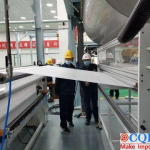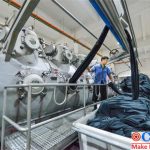Development Of Made In China,Thinking About Deep Transformation
Since China’s reform and opening-up, “Made in China” has experienced rapid development and made great contributions to China’s economy and the world economy. However, few people pay attention to the development of the whole historical process, and the foreign trade industry pays more attention to the existing policies, so as to follow the policies and change the business strategy in time. Therefore, with the exhibition of a photographer’s works, foreign traders were shocked, and everyone saw the real “workers”. “These people have supported the words’ Made in China’ and they deserve to be seen.”
Zhan Youbing comes from Hubei with high school diploma. In 2000, he came to work in Dongguan, Guangdong Province and began to photograph the working life of workers with cameras. In the past 20 years, he has taken 1.5 million photos. It records the process that young women workers on both sides of the assembly line are gradually replaced by automatic machines.
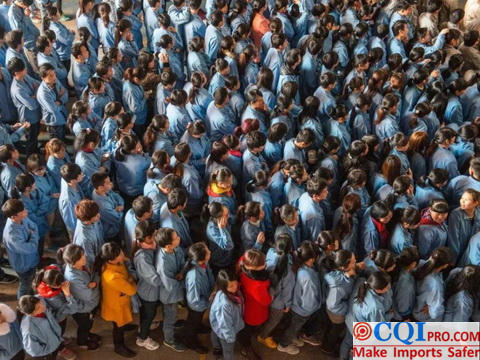
On December 31, 2014, when the paper products factory held the sports meeting, all the employees gathered.
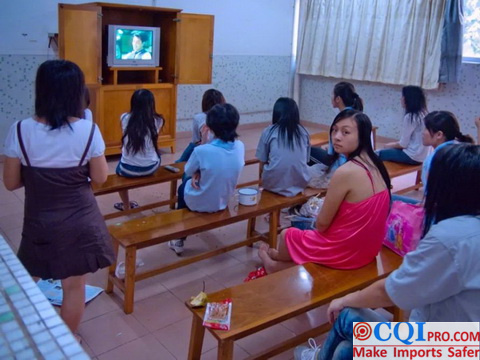
On May 26, 2010, the public TV room in the female dormitory of the electronics factory.
With these photos, he fought back all the way from the security captain and won the award of excellent photographer in news report at Pingyao International Photography Festival. His works have become the darling of major photography festivals in China, and he was invited to hold a personal photography exhibition “Made in China” in New York.
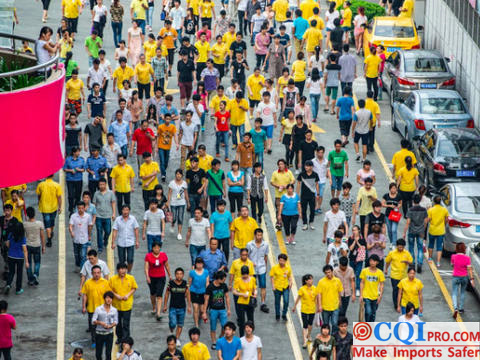
On June 6, 2014, mworkers from toy factories returned to their dormitory after work.
Chang ‘an Town belongs to Dongguan City, located at the junction of Dongguan and Shenzhen, and is the most densely populated place for workers in China. The map shows that Chang ‘an Town is full of science and technology parks, industrial parks and industrial zones, which are matched with staff quarters and cheap rental houses. A large number of young people who work in Shenzhen choose to live in Chang ‘an because of the high rent in Shenzhen and commute between the two cities every morning and evening.
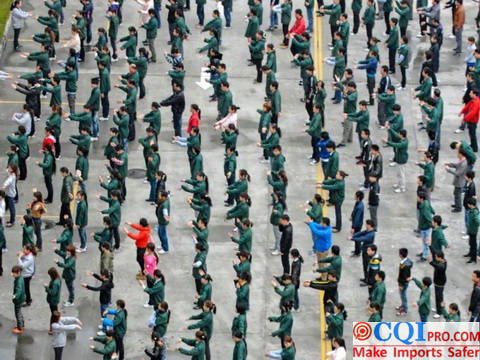
On March 9, 2012, the employees of the shoe factory did morning exercises.The factory was closed in 2018.
All the photos of Zhan Youbing were taken in such an environment, which can be called the first-hand information of Chinese migrant workers.
In 2000, Zhan Youbing came to Chang ‘an and worked as an administrative supervisor in a large electronic factory, taking charge of the security work of the whole factory. Before that, he used to be a security guard for a hotel in Shenzhen. In 2012, he was well-known in the photography circle, ended his 17-year “part-time” career and joined Chang ‘an Newspaper as a photojournalist.
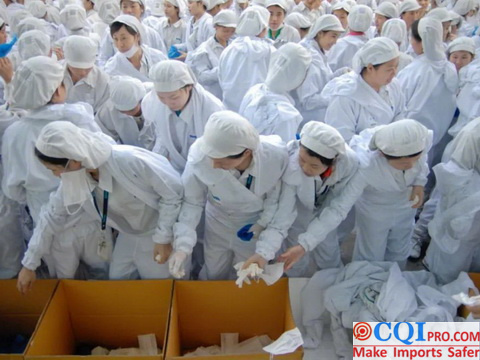
On September 25, 2010, the female workers in the electronics factory just finished the fire drill.
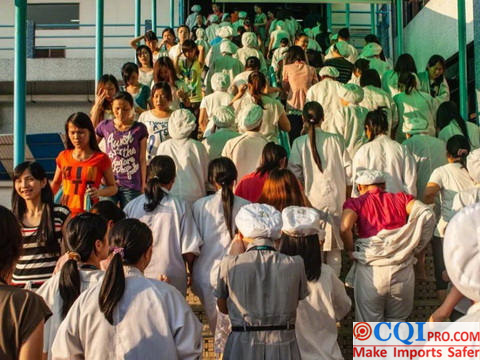
On December 31, 2009, when the electronics factory handed over, people who went in and out of work were mixed together.
In 20 years’ shooting, the record of Zhan Youbing to workers is almost pervasive. Every place they have been to and every detail of their lives, he will take corresponding photos. During such meticulous shooting, he recorded the growth process of several generations of migrant workers from youth to middle age in the first two decades of the 21st century, and also recorded the changes of China’s industrial zones and manufacturing industries.
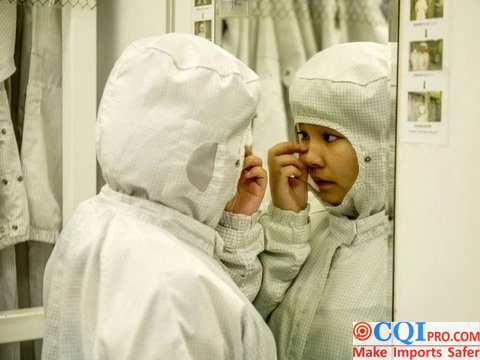
On December 5, 2014, the female workers in the electronics factory looked in the mirror before entering the clean room.
Development Of Made In China,Intensive Working Period
Electronic factories are characterized by a large number of women workers, and 95% of the employees in a factory are women. The production workshop of his electronics factory is very close to Foxconn. The production line is a clean room. Before entering, employees should wear clean clothes and masks with only a pair of eyes exposed. Hand washing, disinfection, and then through the bathroom, can enter the dust-free line to work.
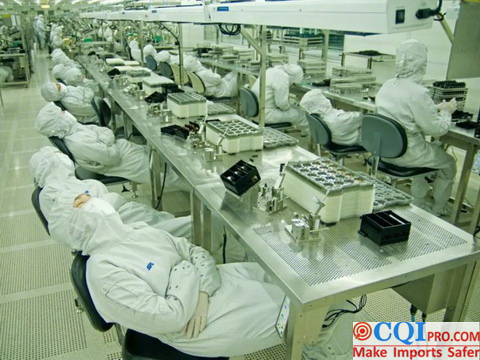
On January 5, 2011, the female workers in the electronics factory rested in the locker room.
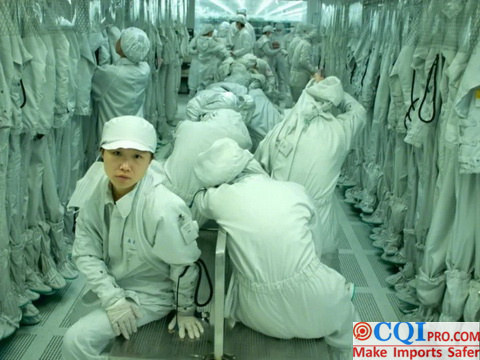
On January 5, 2011, the female workers in the electronics factory rested in the locker room.
Every day, they start working at 7: 00 a.m., have 50 minutes to eat at noon, and have 10 minutes to rest in the morning and afternoon, so that they can go to the toilet and drink water, and they can’t leave the clean room at other times. In theory, I get off work at 7: 00 p.m., but overtime is the norm. The general salary of assembly line workers is only 14 yuan per hour. If they don’t work overtime, they can earn more than 3,000 yuan a month at most. Only by working overtime can you get more wages
Before 2008, most of the processing factories in the Mainland came from labor-intensive enterprises such as clothing, shoes, toys, plastics, electronics and hardware. This era is also called the labor-intensive era of China’s manufacturing industry. At that time, large factories with more than 3,000 employees or even tens of thousands were everywhere in Dongguan.
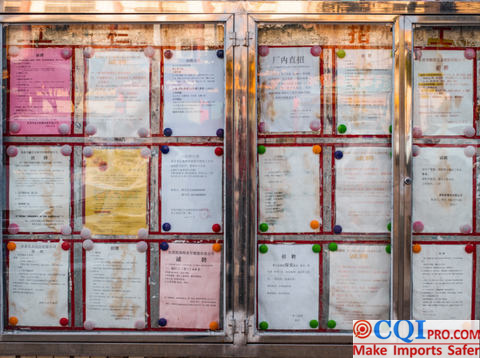
On February 26, 2020, the recruitment column of the industrial zone.
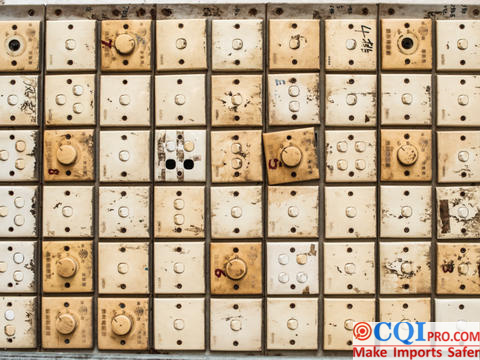
On December 5, 2014, the power switch of the garment factory workshop.
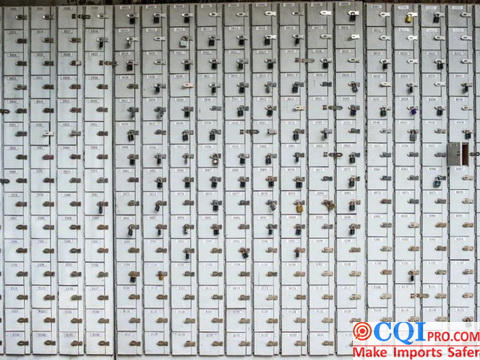
On September 5, 2013, the mobile phone cabinet outside the electronics factory workshop.
After entering the industrial zone, you can generally see a bulletin board covered with job advertisements for twenty or thirty factories. In the workshop, the lockers, teacups and rice bowls in the canteen are very serried. In the dormitory area, rows of dormitory buildings, the water meters of rental houses are dense, the keychains are hung neatly on the wall, and the clothes on the balcony are hung thickly.
Under so many dense things, where are the people?

On December 31, 2014, Dongguan City, Guangdong Province, employees of the printing factory.
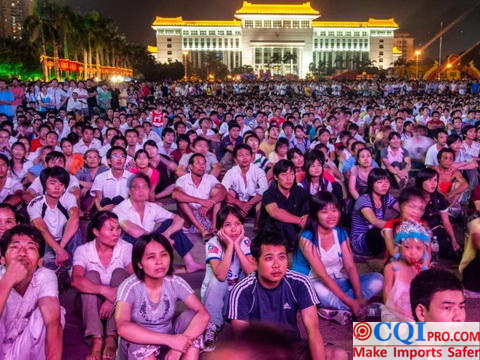
On October 1, 2009, migrant workers watched the National Day military parade on TV in the square.
In the past, there were some Taiwan-funded factories that let employees do morning exercises before working every morning, and everyone concentrated under a huge open space. When it is time to eat, people rush into the canteen. During the shift change, people who go to work and those who go off work come and go to factory. Looking down from above, you can see the dense heads one by one. And people, as an organism, their living space has been compressed to the maximum extent.
All production lines have the same logic, subdividing the process of products, and each employee only needs to do one of them, so that the efficiency is the highest and the value is the greatest. This kind of division of labor will make people more and more mechanical. Workers may have worked in shoe factories all their lives, but they don’t know how to make shoes, and finally they can only be trapped in the production line.
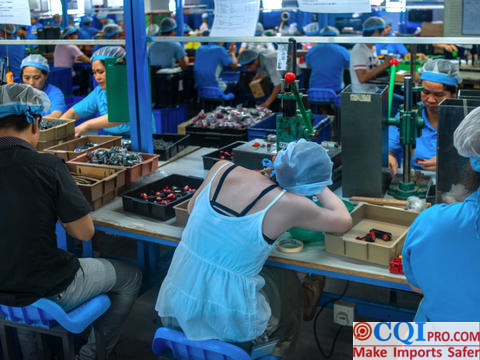
On August 12, 2015, the female workers on the production line of the toy factory.
Development Of Made In China,Countless Workers
Zhan Youbing was the first generation of workers, who came to Dongguan in their 20s. They have no relatives and friends here,who can only live in factory dormitories. At that time, there were five bunk beds in a dormitory, with a total of 10 beds, each with two people. The dormitory also has strict system regulations, which require specific time to switch on and off lights and restrict outsiders from entering.
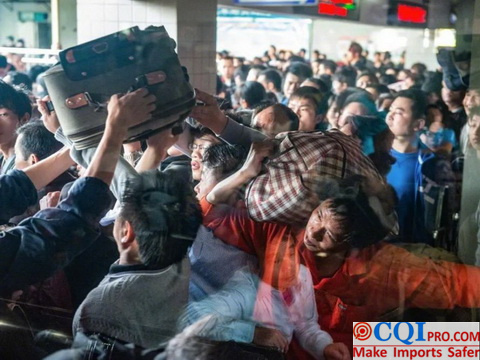
On February 2, 2013, at the long-distance bus station before the Spring Festival, migrant workers who were preparing to go home struggled through the crowd.
The most troublesome thing is to get into a relationship. The characteristic of industrial zone is that besides working, it is working overtime.Only a small range of activities can be carried out in industrial zone at other times. You can only meet your darling in a limited time and place.You may sit on a bench in an industrial area for a while, or lie on the grass for a while.Many images from Zhan Youbing are taken in these spaces.
When a person’s most private life can only be presented in a public space, it shows that the living situation is still rather hard.
The only idea of the workers at that time was to go back to their hometown when they got married and stop working. In fact, this idea is impossible to realize. Many people are not used to it after returning to their hometown for two or three months. Although it is hard to work, everything in the industrial zone is very convenient and every thing is provided by a special person, with a fixed salary every month.
Back to the countryside, only land, no income. If they want to drink a cola, maybe the small shop in the village hasn’t sold it yet. Finally they came back to the workshop. When the generation of Zhan Youbing came out, they were young people. After more than 20 years, their children also came out and entered the assembly line, becoming workers in the new era.
In the past, there was no hot water bath, but taking a cold bath every day, the water pressure was not enough. Nowadays, most factories provide hot water, air conditioners, washing machines, public TV rooms and even wireless, the conditions are greatly improved.
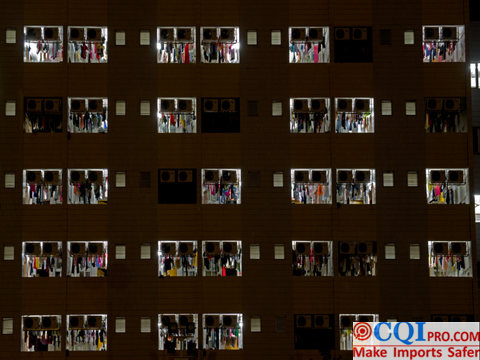
July 4, 2012, night view of electronic factory. All dormitories are air-conditioned, just like a lamp at night. There are always many moths flying around the only light source. The workers are these moths, and they pounce on it from generation to generation.
A factory that cannot leave, a rural area that cannot go back.
Development Of Made In China,The Interesting Life Of Workers
Zhan Youbing’s record of his workmates began from the moment he first arrived in Guangdong. Transfer from the railway station to the industrial zone, find a job in the industrial zone, take exams and training after admission, and work in the production line. After work, I eat in the canteen, live in the dormitory, go shopping and play on weekends, and return to my hometown from Guangdong during the Spring Fesitival holiday. Everyone thinks that migrant workers are very hard, but what many people don’t know is that migrant workers also have rich life experiences, emotional distribution, and have been experiencing development and change.
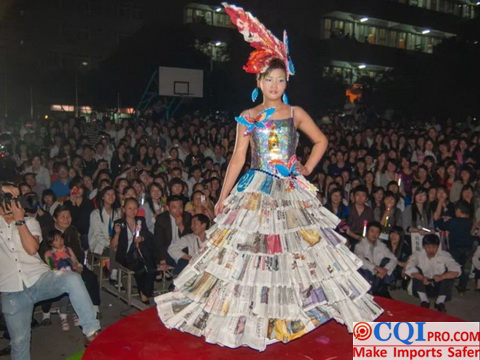
On November 7th, 2010, there were nearly 20,000 employees in the electronics factory and various recreational activities were held every year, among which the female model competition was particularly popular. Since 2010, Zhan Youbing has taken pictures of some female model competitions held by factories. When it is difficult to recruit, the factory will hold such cultural activities to attract more people to apply. The participants were all women workers on the assembly line and the competition was divided into different links, such as uniforms, dresses and swimwear, as well as talent shows such as dancing.
After he put these images on the Internet, the click rate exceeded 30 million in just over two hours. The scenes shown in these photos completely conflict with people’s stereotypes about working girls, which has aroused great repercussions. Some people attacked these images and a lot of negative messages were disgusting. In fact, activities like this are common in industrial areas and young people who work will go dancing in the square, singing in KTV, dyeing their hair and tattooing to follow the fashion.
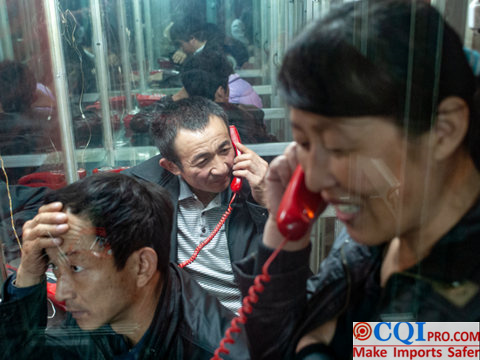
On January 1, 2012, migrant workers from Xinjiang rarely called their families.
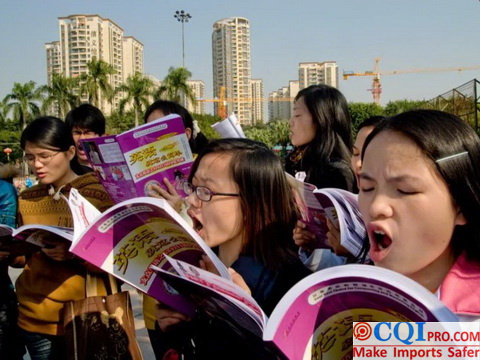
On January 1, 2011, factory girls read English aloud in the square.
He also took a photo, in which women workers read English in the square with their teachers in their spare time. They are not satisfied with working on the assembly line, learning English at their own expense and preparing for future career change. He took these photos in the hope that everyone could see the vivid image of a migrant worker, not just the machines sitting on the assembly line.
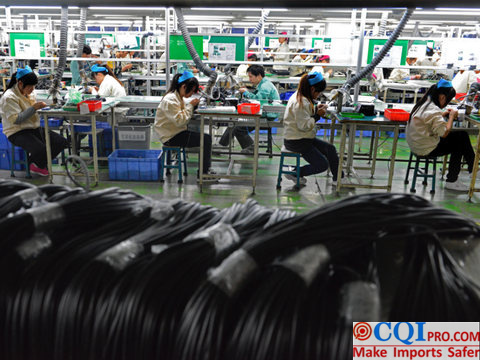
On December 21, 2012, the production workshop of the electronic wire factory.
When he was a soldier, many relatives and friends from his hometown went out to look for jobs and most of them went to Guangdong. At that time, they wrote to him that there were job advertisements on all the telegraph pole. Everyone described the working life very comfortably. After work every day, they bought a can of Jianlibao and walked back to the dormitory while drinking, which made Zhan Youbing fascinated.
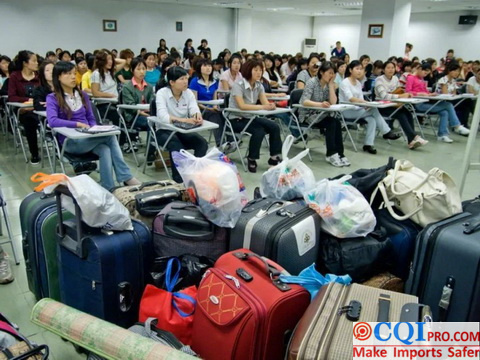
On August 15, 2007, the electronics factory recruited new employees to take the recruitment examination. The contents of the examination were simple Chinese, mathematics and English.
In 1995, Zhan Youbing retired and returned to Hubei. A week later,he took the train to Guangdong, stayed in Shenzhen for five years.He arrived in Chang ‘an, Dongguan in 2000. At that time, Chang ‘an was still a village full of farmland. There are not many factories, but there are people looking for jobs everywhere. He got his first job because he was retired from the armed police and had better physical strength. During the interview, he did 102 push-ups,more than 200 candidates got down,only he could continue to do it,then he was hired.
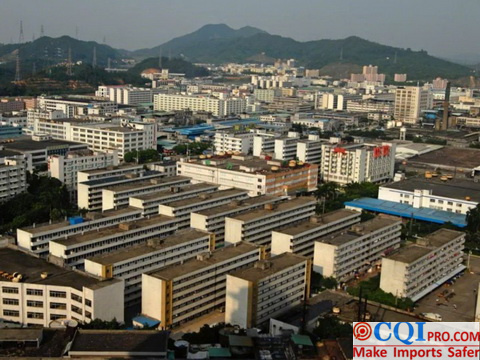
The industrial zone in 2008 has now been leveled and rebuilt as a new commercial center.
In just a few years, large factories were set up, farmland and fish ponds were filled to build factories,which formed industrial parks. The industrial park is getting bigger and bigger, with more and more workers and more abundant products. All the bosses miss it very much. When they placed orders in Dongguan, they could collect all the necessary spare parts in one day, which is why Dongguan can keep alive forever.
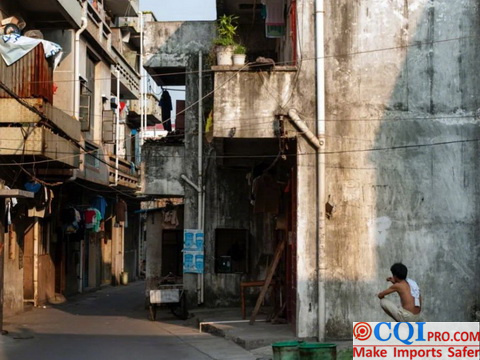
However, the price is that the surrounding environment is getting worse and worse. As soon as you walk through the industrial zone, you will smell a pungent smell. The river slowly turns black and there are chimneys all over the place facing the sky.
Great changes have taken place in Dongguan during the 20 years when Zhan Youbing took pictures. In the past, only the Pearl River Delta was relatively developed. Later, Beijing-Tianjin-Tanggu, Jiangsu, Zhejiang and Shanghai all developed greatly. People moved to different places, instead of rushing to Guangdong alone. At the most developed time in Dongguan, factory recruitment was very strict with age, almost only young women under 25 years old were recruited and there were still too many people. As recruitment becomes more and more difficult, they have to relax their requirements. At the age of 50 can find a jod and male workers are not a problem.
Now, the scale of the factory has been further reduced. Now there may be dozens or even hundreds of small factories in the industrial park whihch rented by a factory in the past. In addition, many factories have been changed into fully automatic production lines and it is hard to see rows of women workers sitting next to the production lines.
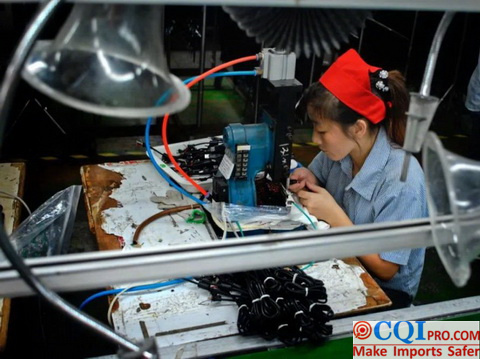
On July 24, 2011, the female worker of the electronic wire factory.
The Recorded Development Of Made In China
Since 2000, taking pictures has become the most important part of Zhan Youbing’s life. Until now, after he got up, the first thing he did was take a camera and shoot in the industrial zone. After lunch break, after work and even holidays, all the time is devoted to it. The purpose of taking these photos is not to spread simply, but to record a history of a group.
The Chinese government has a report on the labor force. In 2019, about 270 million migrant workers came from rural areas to work in industrial areas. From the 1980s to today, so many people have experienced such a long period of history and the stories described them need attention. Since Zhan Youbing once lived and participated in it, he felt obliged to record it, so that future generations could see some context of social development from our living experience and traces of life.
Especially in today’s rapid development, as long as there is a moment that has not been recorded, it is likely to leave regrets forever. For example, the COVID-19 outbreak occurred in 2020. If there is no filming, how people live in during the epidemic and how much changes have taken place compared with the life before the epidemic, this narrative text is incomplete.
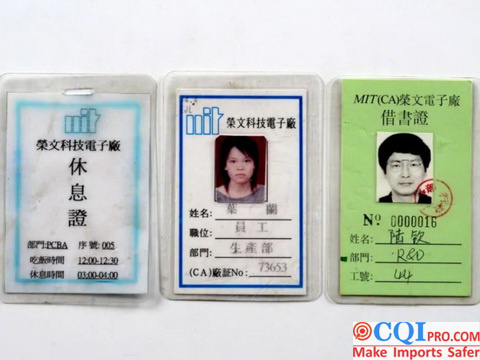
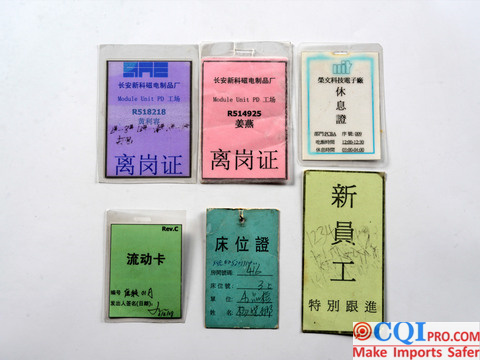
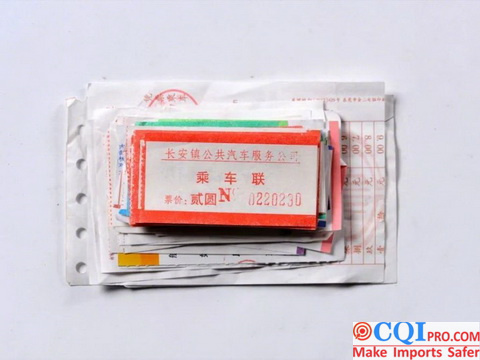
Various articles of migrant workers
Zhan Youbing also collect physical evidence and traces of migrant workers who once lived in industrial areas through various channels. In some second-hand books markets, some letters written by migrant workers and photos taken under various circumstances were collected. All things should add up to thousands of pounds and then they are classified and scanned, finally a ducument is presented. If someone intends to study the development history of labor, “Made in China” and manufacturing in China, they can make use of these images and objects.
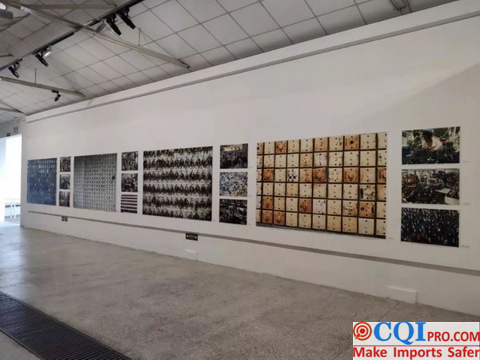
Exhibition site of the 3 rd Documentary Photography Awards in 2019.
In 2016, the photos of Zhan Youbing were exhibited in a gallery of JCC College of State University of New York and the name of the exhibition was “Made in China”. Many of the teachers who came to the exhibition were university teachers, especially those from institute of technology, who showed strong interest in these photos, which was more than those engaged in art education. He always said that the photos lived longer than he did and the photos went further than he did. At present, the photos did.
There are 1.5 million photos in the past 20 years, all of which are vivid life under the lens. Every history of “Made in China” is scaled in the electronics factory and the level of supply chain management is also increasing. In the next 20 years, workers may be completely replaced by machines, only leaving the core part. China will also improve the structure of the areas where various industries are located, so that the industrial chain will drive the development of local economy and increase the development opportunities of additional industries.
CQI5 is committed to providing importers worldwide with product quality inspection services that far exceed those of our peers. If you are planning to import or have imported from China or Southeast Asian countries, please contact us cs’@’cqipro.com to learn more about how we can make your imports safer.
This article is an original article for CQI Inspection, who is committed to providing high-quality product inspection technology and know-how sharing for global importers and retailers to make imports safer.
All rights reserved. The contents of this website provided by CQI Inspection may not be reproduced or used without express permission.
For reprint, please contact with CQI Inspection, thank you.



